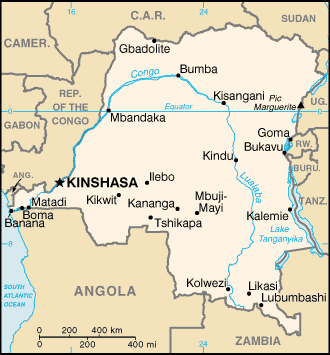Map:

Overview:
Established as a Belgian colony in 1908, the Republic of the Congo gained its independence in 1960, but its early years were marred by political and social instability. Col. Joseph MOBUTU seized power and declared himself president in a November 1965 coup. He subsequently changed his name - to MOBUTU Sese Seko - as well as that of the country - to Zaire. MOBUTU retained his position for 32 years through several subsequent sham elections as well as through the use of brutal force. Ethnic strife and civil war, touched off by a massive inflow of refugees in 1994 from fighting in Rwanda and Burundi, led in May 1997 to the toppling of the MOBUTU regime by a rebellion led by Laurent KABILA. He renamed the country the Democratic Republic of the Congo (DROC), but in August 1998 his regime was itself challenged by an insurrection backed by Rwanda and Uganda. Troops from Zimbabwe, Angola, Namibia, Chad, and Sudan intervened to support the Kinshasa regime. A cease-fire was signed in July 1999 by the DROC, Zimbabwe, Angola, Uganda, Namibia, Rwanda, and Congolese armed rebel groups, but sporadic fighting continued. Laurent KABILA was assassinated in January 2001 and his son Joseph KABILA was named head of state. In October 2002, the new president was successful in negotiating the withdrawal of Rwandan forces occupying eastern Congo; two months later, the Pretoria Accord was signed by all remaining warring parties to end the fighting and establish a government of national unity. A transitional government was set up in July 2003; Joseph KABILA remains as president and is joined by four vice presidents representing the former government, former rebel groups, and the political opposition.
The People:
Population: 60,085,804
note: estimates for this country explicitly take into account the effects of excess mortality due to AIDS; this can result in lower life expectancy, higher infant mortality and death rates, lower population and growth rates, and changes in the distribution of population by age and sex than would otherwise be expected (July 2005 est.)
Age structure:
0-14 years: 48.1% (male 14,513,779/female 14,396,952)
15-64 years: 49.4% (male 14,579,101/female 15,121,297)
65 years and over: 2.5% (male 597,776/female 876,099) (2005 est.)
Religions:
Roman Catholic 50%, Protestant 20%, Kimbanguist 10%, Muslim 10%, other syncretic sects and indigenous beliefs 10%
Government Type:
dictatorship; presumably undergoing a transition to representative government
Leader(s) to pray for:
chief of state: President Joseph KABILA (since 26 January 2001); note - following the assassination of his father, Laurent Desire KABILA, on 16 January 2001, Joseph KABILA succeeded to the presidency; the president is both the chief of state and head of government
Source: The World Factbook
View All Countries